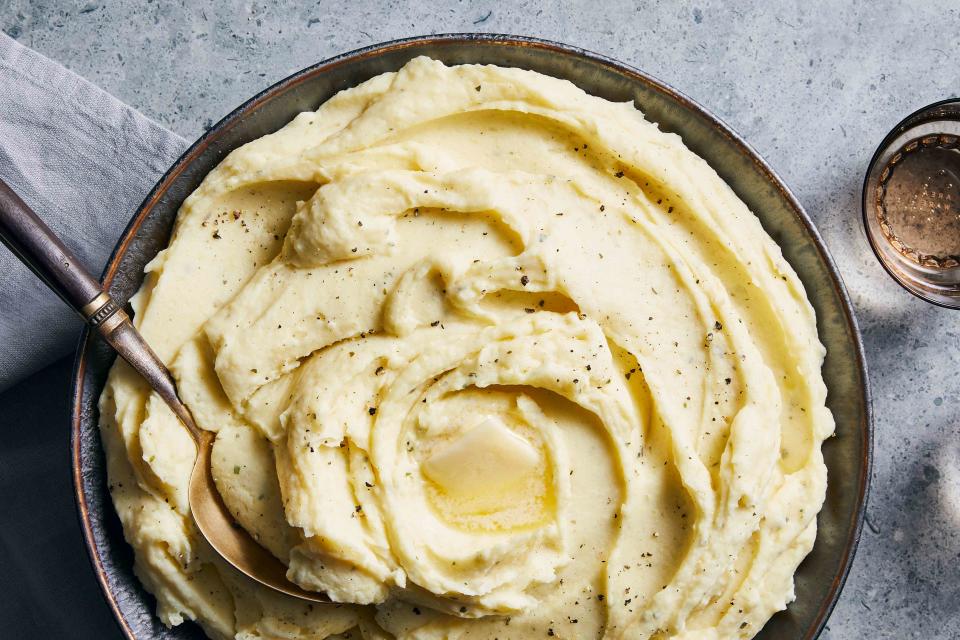The Best Potatoes For Making Mashed Potatoes
Pick the right potato for your preferred style.

Dotdash Meredith
Luscious baked sweet potatoes, sweet potato casserole (with or without marshmallows!), roasted potatoes, skillet-fried potatoes, potatoes au gratin, trendy Hasselback potatoes—there is no rendition of Thanksgiving’s favorite family of tubers that isn’t welcome at the holiday table. However, there’s also not a one of them that can replace the mandatory star(ch) of the season, and that’s a big bowl of buttery, creamy, fluffy mashed potatoes.
No matter what other potato dish you might have on the menu, this is the one that you’ll be judged on and one of the most critical staples of the holiday. Because while turkey’s great and all, realistically, eating season’s one for the carbs.
So how do you best ensure that your mashed potatoes live up to the high expectations? Well, you start with the best potatoes for mashed potatoes.
No matter if your technique is ricing, smashing, milling, whipping, or any other way to fluff them into smooth (or chunky!) submission, if you don’t have the right potatoes for mashing, you’ll come a ways short from having your guests break into the Mashed Potato over your mashed potatoes.
:
What Are the Best Potatoes for Mashing?
"Best" is a subjective term, so first, you have to ask yourself what qualities you value most in a good mashed potato dish. Do you want something you can whip air into, that rises up light, bright, and silky smooth? For a perfect canvas that you can gussy up with your own signature herbs, seasonings, and mix-ins, russet potatoes can’t be beat. They rise gloriously and voluminously when mashed, thirstily absorbing any liquids you mix with them, saturating the potatoes with broth and cream.
On the other hand, if you favor potatoes that turn into denser swirls so buttery the dish even takes on that dairy’s hues, you can count on Yukon Gold. These naturally rich potatoes come with the added benefit of being less absorbent of water while remaining nicely starchy, which means it’s less likely to get gummy if you accidentally overwork them. Also, their slightly firmer composition leaves room for chunks and their thinner skins give you the option of skipping the peeling step if you prefer your mashed potatoes to include both of those traits.
Another option that’s popular among many is to Goldilocks it, mixing the two varieties for an in-between blend that’s “just right.” A 1:1 ratio will do the trick, but you can shift that proportion to favor attributes you like more.
For instance, if high-rising, pillowy mashed potatoes are more important than deep buttery flavor, use more russets. If you want more texture without giving up versatility, edge the balance to include more Yukon Golds.
:
Why Are These the Best Potatoes for Mashing?
It all comes down to starch content.
Of all the hundreds of varieties of potatoes the American palate is treated to, they still mostly break down into two categories: waxy or starchy.
Starchy potatoes are favored for mashing because they cook up fluffy and airy, making them easy to smash down and lift back up. Plus, their inherent dryness makes them receptive to the ingredients you’ll add into your signature mashed potatoes, infusing every bite with irresistible flavor.
On the other hand, using waxy potatoes, such as red, new, and fingerling potatoes, set you up for a tougher, more laborious mashing process; lower level of absorption of critical components such as butter; and—worst of all—a high risk of a thick, pasty texture that sits as flat as your dish may fall. You’ll want to save these red and white potatoes for dishes where you want to preserve the shape and bite of the potato, such as potato salad or oven-roasted potatoes.
How To Make Perfect Mashed Potatoes
Beyond picking the right potatoes, there are all kinds of neat tricks you can add to your repertoire to ensure that your mashed potatoes are the talk of Thanksgiving. From easy prep hacks like how to prevent the slices from sticking to your knife and how to keep them from turning brown, the ways you can elevate your mashed potato game are as endless as the variations of this classic side.
You can start with this recipe that showcases Yukon Gold potatoes and uses only six ingredients, or troubleshoot beforehand by reading about common mistakes people make with mashed potatoes. If you run into problems, like soupy mashed potatoes, we have a guide for that, too!
But start with the best potatoes for mashed potatoes, and the rest will come along just fine.
For more Southern Living news, make sure to sign up for our newsletter!
Read the original article on Southern Living.

